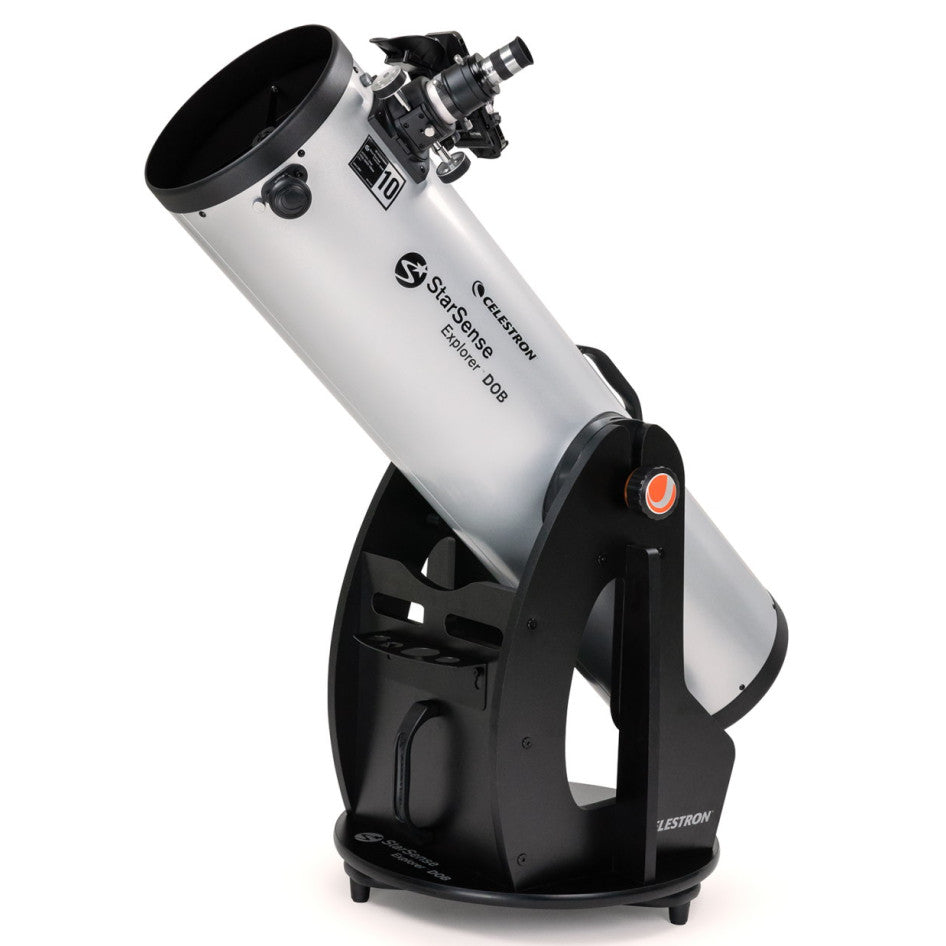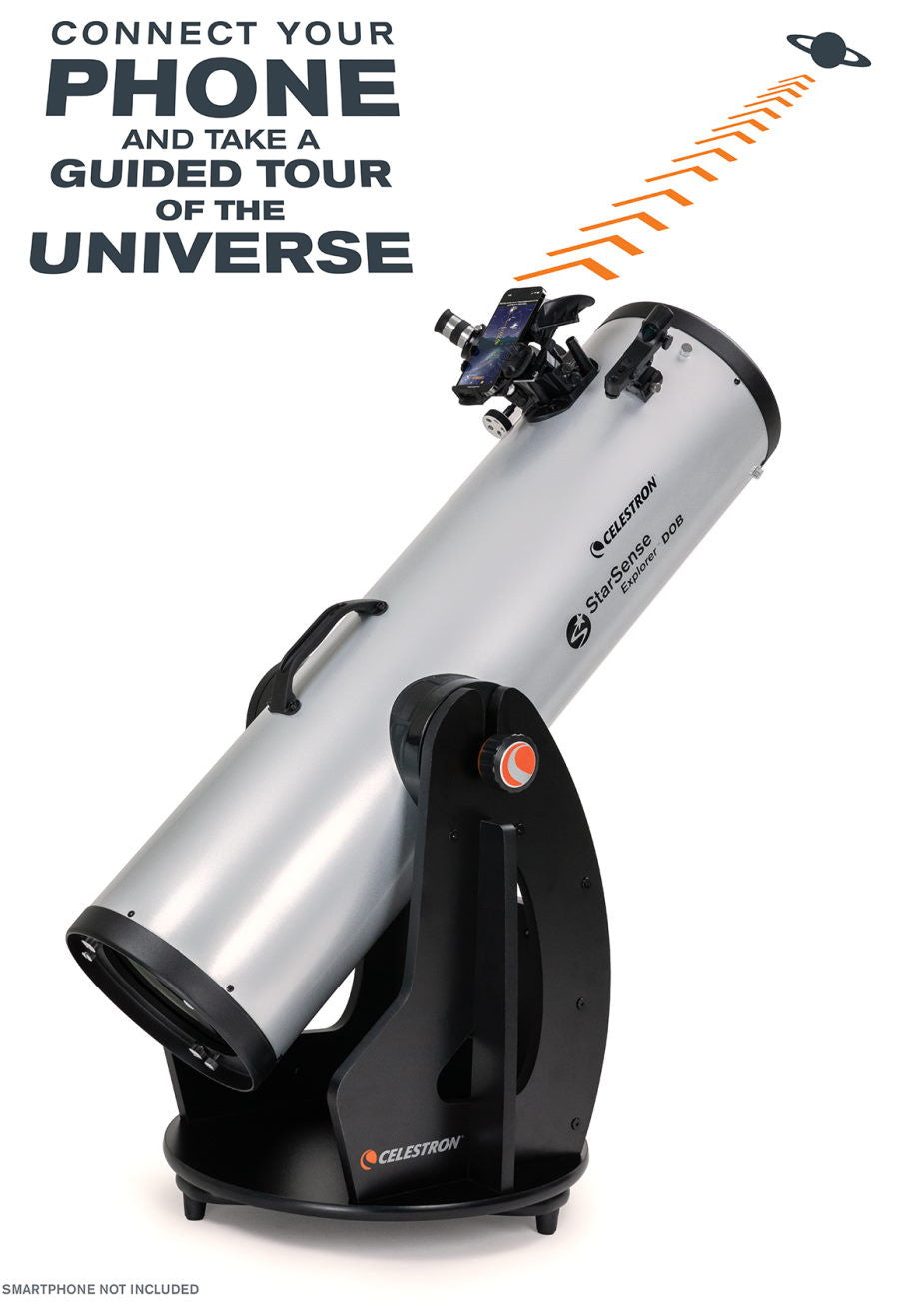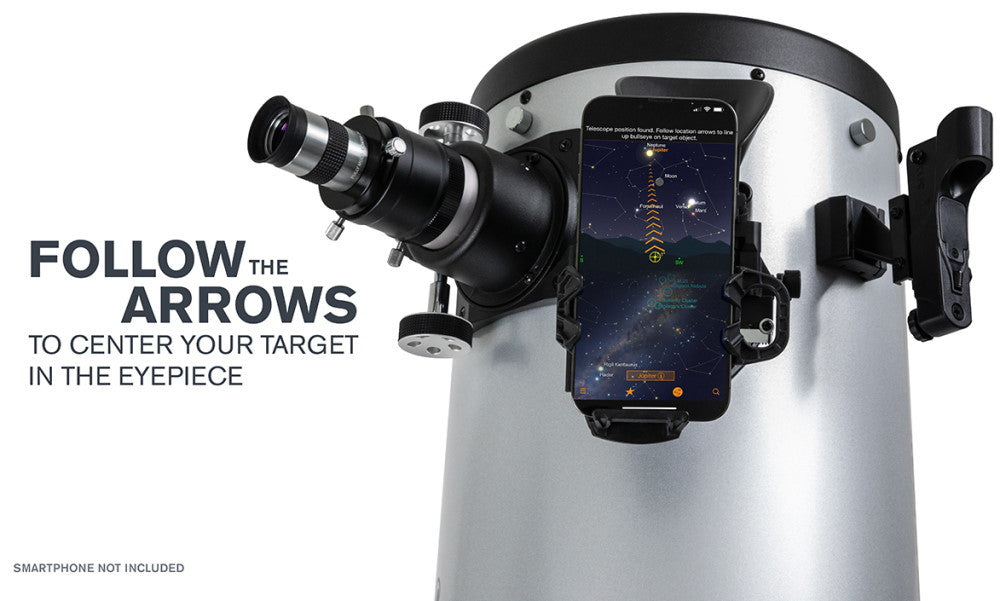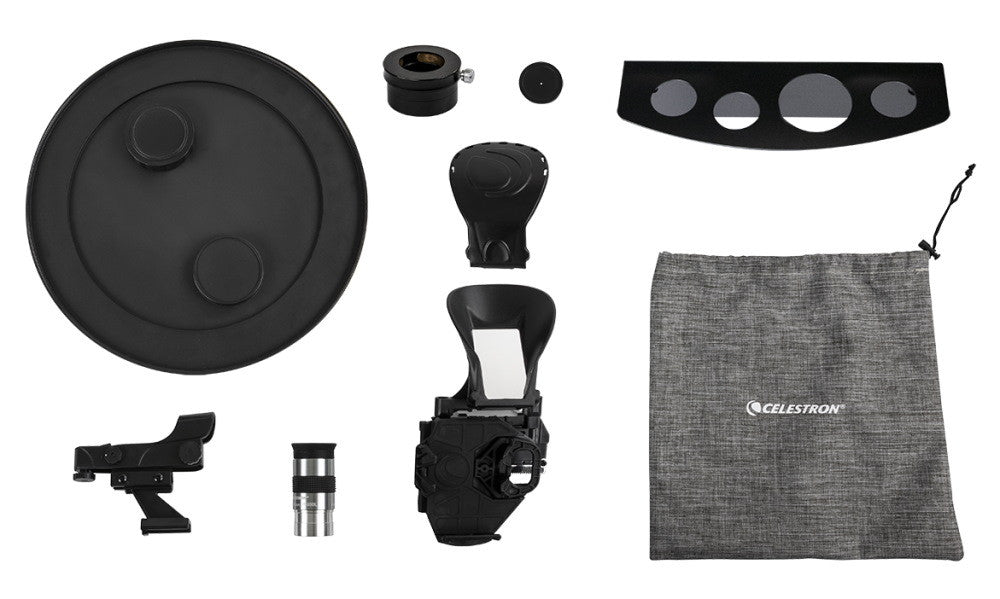Description
Description
The Celestron Starsense Explorer Dobsonian Telescope - 254mm will unleash the power of your smartphone to take you on a guided tour of the night sky - no telescope experience required. Patented, award-winning StarSense sky recognition technology uses your smartphone to analyze star patterns overhead and calculate the telescopes position in real-time. A large 10" parabolic primary mirror with XLT coatings helps you make the most of StarSense technology. Locate faint, deep-sky objects in seconds and see them in more detail than ever before.
A sturdy, Dobsonian-style base with large diameter bearings and variable altitude tensioning makes it easy to follow the on-screen arrows to your desired target. When the bullseye turns green, it's ready to view in the telescope's eyepiece. StarSense Explorer app automatically generates a list of objects currently visible. View planets, brighter nebulae and galaxies, star clusters, and double stars from the city. Or take your telescope to darker skies to see even more.
Includes a 25mm Plssl eyepiece, a 2" Crayford focuser, the StarSense smartphone dock, a StarPointer red dot finderscope, an eyepiece rack, and a collimation tool. Celestron has reinvented the Dobsonian telescope with StarSense Explorer the first Dobsonian that uses your smartphone to analyze the night sky and calculate its position in real-time. This large-aperture Celestron StarSense Explorer is ideal for serious beginners, thanks to the app's user-friendly interface and detailed tutorials.
It's like having your own personal tour guide of the night sky. The large aperture will ensure that you wont outgrow the telescope as you continue on in your astronomical adventures. Dock, Launch, Explore. Leave complicated star charts, imprecise planetarium apps, and computerized mounts behind. With StarSense Explorer, locating objects has never been easier, faster, or more accurate. Within minutes of setting up the telescope, you'll be navigating the sky with confidence. Simply place your phone in the unique StarSense dock and launch the StarSense Explorer app.
After aligning your phone to the telescope's optics (a quick and easy procedure), StarSense Explorer generates a list of celestial objects currently visible. Make your selection and arrows appear on-screen, guiding you as you move the telescope. When the object is ready to view in the eyepiece, the bullseye turns green. As you observe, listen to hundreds of audio descriptions and view detailed information about thousands of objects within the apps robust database.
An ultra-stable Dobsonian base provides a sturdy foundation for StarSense Explorer. It features large diameter altitude bearings with variable tensioning, Teflon azimuth bearings, and braces on the side panels for extra stability (unlike most 10 Dobsonian bases). The altitude bearings provide a smooth up-and-down motion while the integrated altitude "brake" system allows you to adjust the tension along the altitude axis for smoothest motion even with slight imbalances.
The panning knob on the telescope tube provides an ergonomic grip so you can precisely point the telescope without introducing heat from your hands into the optical system. As celestial objects appear to drift across the night sky, you'll be able to easily follow them with minor adjustments to the telescopes position.
Dazzling Views with High-Quality Optics. With a large 10" Newtonian reflector optical tube, this telescope has enough light-gathering ability to bring out impressive detail in celestial objects while remaining remarkably portable. You can expect sharp, bright views of Jupiter's four Galilean moons, its cloud bands and Great Red Spot, the rings of Saturn, the gaseous glow of the Orion Nebula, dust lanes in the Lagoon Nebula, and our neighbor galaxy, Andromeda. Compared to the StarSense Explorer DX 130 AZ, the 10" Dobsonian has 380+% more light gathering area, providing better views of faint objects.
All mirror surfaces are coated with our XLT optical coatings to visibly increase contrast and light throughput for brighter views. With XLT, you'll be able to discern subtle details while viewing the Moon and planets, as well as faint galaxies and nebulae. The mirrors are made of low-expansion optical glass, which helps ensure the best images under changing environmental conditions.
This telescope also comes with a high-quality 2" Crayford focuser. The Crayford design provides precise and smooth movements without focus shifting. It also includes a 2" to 1.25" adapter and a 2" extension tube, so you can use virtually any 1.25" or 2" telescope eyepiece with your StarSense Explorer Dobsonian. The focuser also features a thumbscrew so you can lock in the sharpest focus.
Perfect for the City or Dark Sky Sites. Even if you live in a light-polluted city location, the Celestron StarSense Explorer 10" Dobsonian is advanced enough to easily pick out Jupiter, Saturn, open star clusters like the Pleiades, double stars like Alberio, the Orion Nebula, Andromeda Galaxy, and more of the best and brightest celestial objects.
But if you can take the telescope to an even slightly darker location, more objects will become visible. With this 10" Dobsonian and relatively dark skies, hundreds of fascinating objects are well within your reach. Transporting your StarSense Explorer Dobsonian is easy thanks to the ergonomic carry handles located at the balance point of the tube and base. Dust covers are also included for the front of the tube and the focuser.
Smartphone Compatibility. Celestron StarSense Explorer works with most modern smartphones, including iPhone 6 and up, and most devices running Android 7.1.2 or later manufactured since 2016. For a complete compatibility list, click here. Patented StarSense Sky Recognition Technology. StarSense Explorer uses patented technology and your smartphone to determine exactly where the telescope is pointed in the night sky. A Lost in Space Algorithm (LISA), like the ones satellites use in orbit to correctly orient themselves, helps the app match star patterns it detects overhead to its internal database.
While other astronomy apps may claim that they can help you find objects, they rely exclusively on the phone's gyros and accelerometers, which aren't as accurate as LISA technology. No other app can accurately tell you when your target is visible in the eyepiece.
Features
StarSense Sky Recognition Technology
The Night Sky at Your Fingertips
Ultra-stable Dobsonian Base
High-quality 10" Newtonian
XLT coatings
8" parabolic primary mirror
Large diameter bearings
Calculate the telescope's position in real-time
Specifications
Optical Design Newtonian Reflector
Aperture 254mm (10")
Focal Length 1200mm (47.24")
Focal Ratio f/4.7
Focal Length Of Eyepiece 1 25mm (0.98")
Magnification Of Eyepiece 1 48x
Highest Useful Magnification 600x
Lowest Useful Magnification 36x
Limiting Stellar Magnitude 14.7
Light Gathering Power 1317x As Compared To The Human Eye
Optical Coatings Xlt Reflective Coatings With Silicon Dioxide And Tantalum Pentoxide Protective Overcoatings For Primary And Sceondary Mirrors
Mirror Material Pyrex Equvalent For Primary And Secondary Mirrors
Primary Mirror Thickness 30mm (1.18") (Approx. 1:8 Thickness Ratio)
Secondary Mirror Thickness 11.5mm (0.45")
Minor Axis Of Secondary Mirror 64mm (2.52")
Tube Material Steel
Focuser 2" Crayford Focuser, Includes 2" Extension Tube And 2"-to-1.25" Adapter
Finderscope Starpointer Red-dot Finderscope
Resolution Rayleigh 0.55 Arcseconds
Resolution Dawes 0.46 Arcseconds
Optical Tube Dimensions 1117.6mm X 292.1mm Diameter (44" X 11.5" Diameter)
Optical Tube Weight 13.24kg
Mount Type Altazimuth Dobsonian Base
Base Material Particle Board With Melamine Surfaces And Edge Trim, Carb Compliant
Base Dimensions 673.1mm X 533.4mm X 533.4mm (26.5" X 21" X 21")
Base Weight 11.6kg
Slew Speeds Manual
Software Celestron Starry Night Basic Edition Software And Starsense Explorer App
Total Telescope Kit Weight 24.86kg
Package Content
Optical tube
Dobsonian Base
25mm eyepiece
2" Crayford focuser
StarPointer red-dot finderscope
StarSense Explorer dock
StarSense Explorer unlock code
Eyepiece rack
Collimation cap




